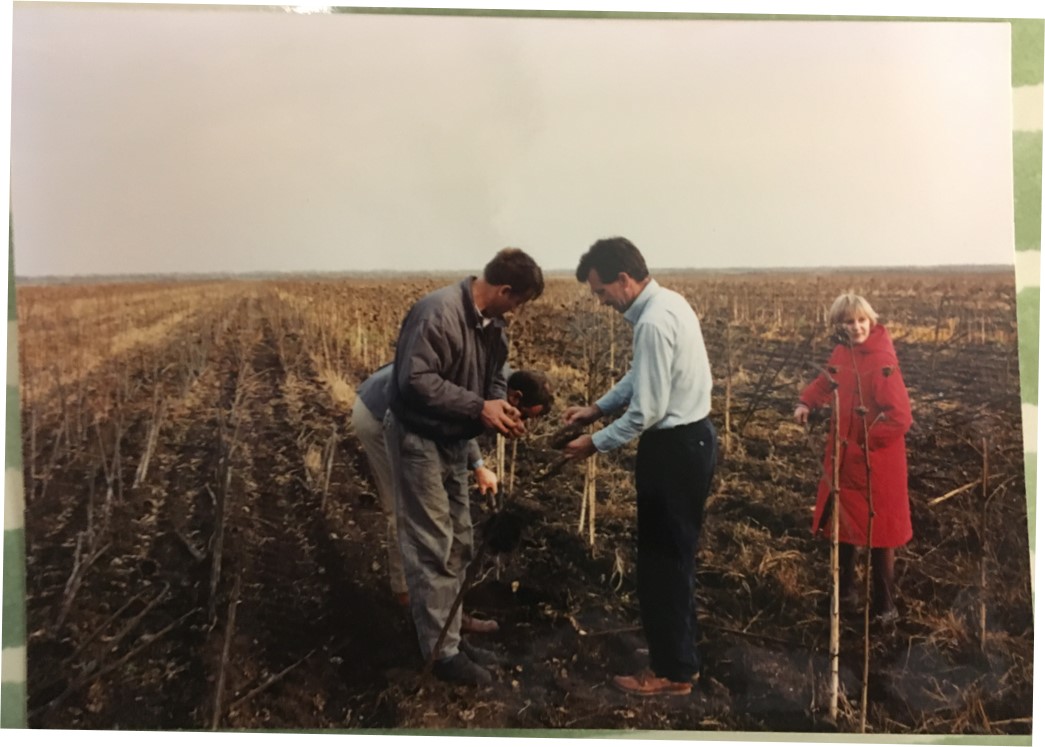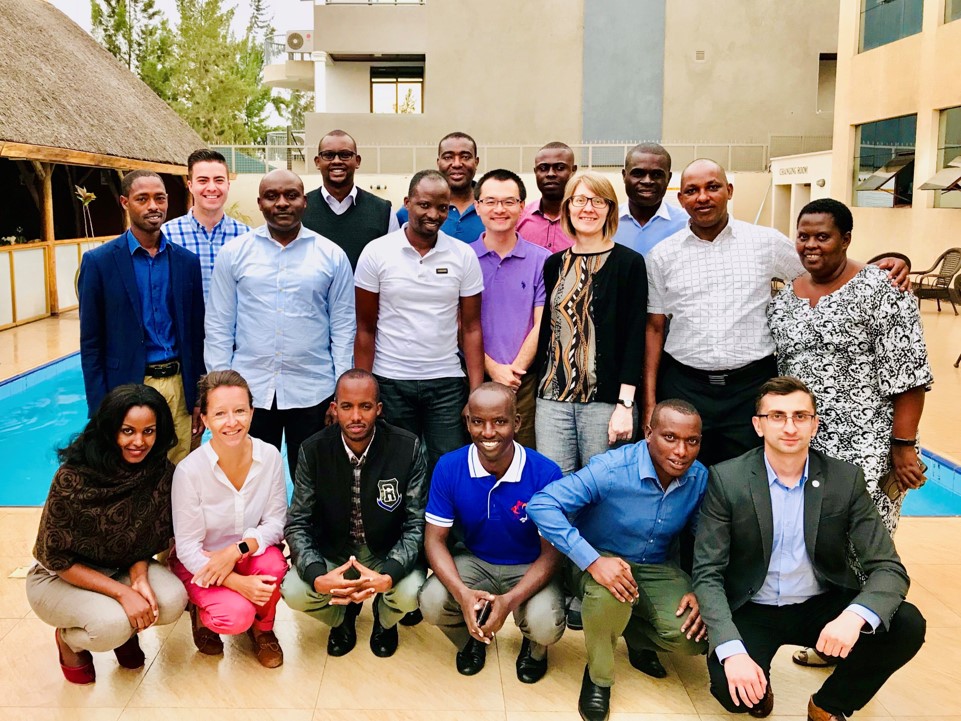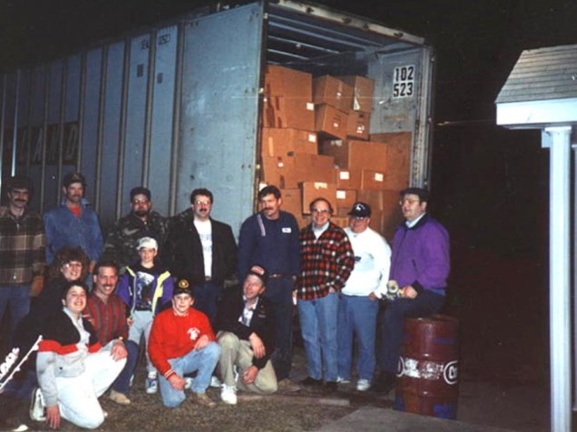In more than 20 years of pursuing excellence in poverty alleviation, failure has been one of the most effective forces for improving our work. We shared the following stories of missteps in a live webcast this week—not to paint them in a triumphal light or to trivialize them—but to practice transparency and share candidly with others, knowing God’s “power is made perfect in [our] weakness.”
 Misstep 1: “We’ll fix your problems for you”
Misstep 1: “We’ll fix your problems for you”
Following the collapse of the Soviet Union in the early 1990s, HOPE founder Jeff Rutt traveled to Ukraine with his church, donating containers of food and supplies to a local church in a small city (pictured above). After several visits, their Ukrainian host pulled Jeff aside and told him the shipments were no longer helping. Instead of charity, what the community needed was a way to help themselves.
In response, the American team bought a sunflower seed processing machine to help their friends generate income locally. “We thought it was an amazing idea,” Jeff shared. “The biggest problem was that it was our thinking.” Without local buy-in, this project also missed the mark, and the machine went unused. Only then did the team try microfinance as a tool for empowering Ukrainian families to invest in their own dreams, and HOPE International was born.
Jeff summarizes this hard lesson with a principle from his experience as a homebuilder: “Building a home’s foundation on a firm footing is analogous to seeking wisdom and input from local leadership—from the people who really understand the culture, what’s important, and what will work locally.”
HOPE has sought to apply this lesson continually, celebrating that national leaders are best equipped to lead. At the moment, nearly all the programs in the HOPE network are managed by national leaders who can apply their deep knowledge and experience in their work.
 Misstep 2: “Yes, we can definitely do that”
Misstep 2: “Yes, we can definitely do that”
The day after Christmas 2004, the deadliest tsunami in recorded history crashed into the coastlines of the Indian Ocean, killing approximately 230,000 people.
When a supporter offered HOPE a large grant to help the survivors, we faced a tough decision. As a small organization eager to make a difference—yet sometimes struggling to make payroll—we were motivated to accept. Despite having no activity in the affected region and no experience in disaster response, our answer was “Yes, we can do that!”
After doing some research, we partnered with a wonderful Sri Lankan organization focused on community and economic development. But over several years, we realized our missions and callings were ultimately not fully aligned. They hoped to go very deep, offering a range of services to a few hundred people, whereas HOPE felt called to scale financial services to many more underserved people. We decided, finally, to amicably part ways.
So where was the mistake? “Looking back, we were not balancing the support from where the donor community was pushing us (which can often be helpful) with where God is calling us as an organization and with the opportunities we saw on the ground,” shares Jesse Casler, HOPE’s chief operations officer.
This misstep also taught HOPE that we’re not best suited to work in every location or situation. Now, when natural disasters strike (such as Hurricane Matthew in 2016), our first response is to direct donors to fund others doing relief work with excellence rather than trying to work outside our core competencies.
We’ve also improved in vetting new opportunities, HOPE’s president Peter Greer points out. “The question is no longer ‘Can we do it?’ but ‘Is this what God is calling HOPE to do? Or is there someone else already doing it that we can connect others to?’ When we take on a worldview of abundance, we’re far more open-handed and make better decisions.”
 Misstep 3: “We can trust without verifying”
Misstep 3: “We can trust without verifying”
Any organization or business operates with daily risks—including that its stakeholders might put personal gain before ethics. Especially because we provide financial services in communities with great needs, HOPE is certainly no exception.
Speaking of his work with another organization before his time with HOPE, Peter shares, “Moments of experiencing fraud have been some of the most painful of my life. And it wasn’t just about the money—it was also the loss of relationships. Lots of factors contributed to those difficult situations, but this was one takeaway for me: I wasn’t loving my colleagues as best I could because we hadn’t put enough controls in place.”
HOPE has had to learn those same lessons in our programs. Ten years ago, our investments in creating robust guardrails were low, but today, we’re in a completely different spot. A stronger framework—supported by an international internal audit team now 18 people strong—has massively improved our preparedness.
With her experience in operations and management with both HOPE and commercial banking in the Congo region, Catherine Houman (pictured bottom row, second left) is an important part of the internal audit team. About building guardrails to curb fraud, she says, “We can help prevent these things from happening, and when they do happen, we can detect them early enough to correct them and further learn from them.”
Moving forward:
While we can’t predict the future, we’re confident in this: the journey of HOPE will continue to be marked by missteps, yes, but also by our God who continues to walk with us through it all. We’re so thankful for our supporters who have listened, counseled, and supported us through celebration and failure alike! Thank you for partnering with HOPE, even through the missteps.
Check out Peter’s answers to live audience questions and watch the full webcast recording here.
















